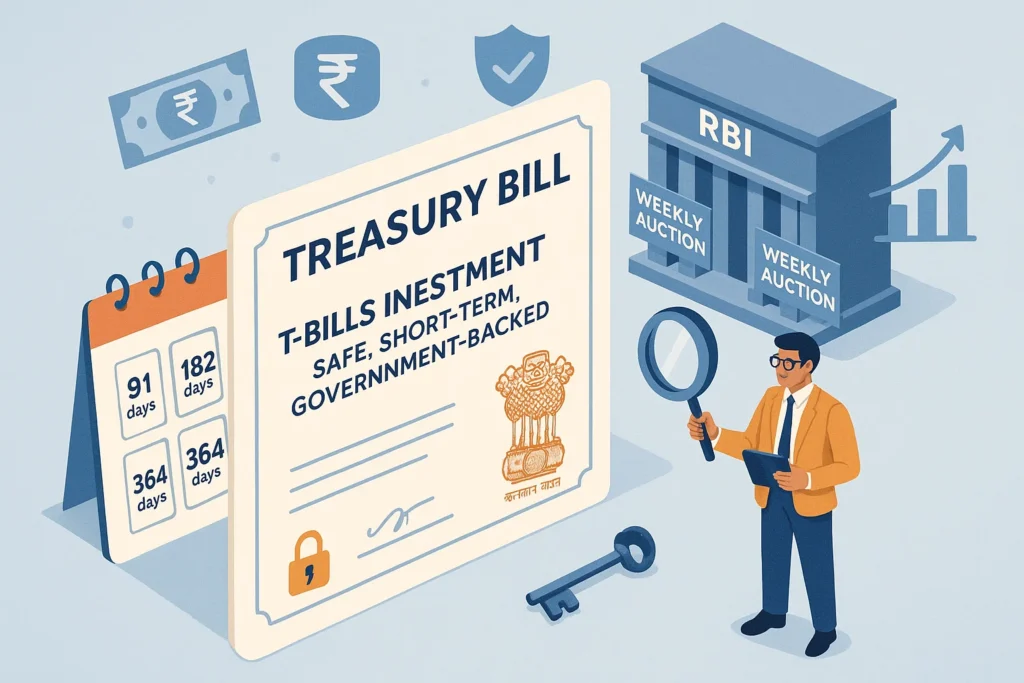Introduction: What Are T-bills and Why Should You Care?
In an environment of volatile stock markets and uncertain returns, many investors are seeking safe, short-term instruments to park their money. Enter T-bills investment—a secure, government-backed option that offers fixed returns over short periods.
T-bills, or Treasury Bills, are short-term debt instruments issued by the Government of India through the Reserve Bank of India (RBI). They offer a low-risk avenue for investors looking to preserve capital and earn predictable returns. If you’re exploring options beyond traditional fixed deposits or looking for a safe place to park your surplus funds, this guide will walk you through T-bills investment step by step.
What Are Treasury Bills (T-bills)?
Treasury Bills are zero-coupon securities issued at a discount and redeemed at face value on maturity. These are short-term money market instruments, designed to help the government manage its short-term financing needs.
T-bills come in three main tenors:
- 91 days
- 182 days
- 364 days
For example, if you buy a 91-day T-bill with a face value of ₹100 at ₹98, you will earn ₹2 on maturity—your return. This is known as discounted issuance, a core characteristic of T-bills investment.
How Does T-bills Investment Work?
Let’s break down the process of T-bills investment:
1. Issuance and Auctions by RBI
T-bills are issued by the RBI on behalf of the Government of India. The issuance happens through a weekly auction mechanism, where participants bid to purchase a specific amount of T-bills.
There are two types of bidding:
- Competitive Bidding (for institutional investors like banks, PDs)
- Non-Competitive Bidding (for individuals and retail investors)
Retail investors can invest via the non-competitive route, where they are allotted T-bills at the weighted average yield decided in the competitive bidding.
2. Discounted Purchase, Face Value Redemption
T-bills are issued at a discount and redeemed at face value. This means:
- No interest is paid during the tenure.
- The return is the difference between the issue price and face value.
Example:
You buy a 182-day T-bill with a face value of ₹100 at ₹95.
At maturity, you receive ₹100. Your effective return is ₹5.
Benefits of T-bills Investment
Safety
T-bills are backed by the Government of India, which makes them virtually risk-free. They carry zero credit risk, unlike corporate bonds or some mutual funds.
Liquidity
T-bills are highly liquid instruments. They can be sold in the secondary market before maturity if needed, offering flexibility to investors.
Short-Term Tenure
With maximum maturity of 364 days, T-bills are perfect for short-term investment horizons, ideal for parking idle cash or planning for near-term financial goals.
Benchmark Role
T-bill yields act as benchmarks for short-term interest rates. Their movements reflect broader liquidity conditions and monetary policy stance in the country.
Portfolio Diversification
Adding T-bills to your portfolio helps diversify risk, especially during market volatility. They serve as a hedge against equity market downturns.
Who Can Invest in T-bills?
The investor base for T-bills is diverse and growing. It includes:
- Banks
- Mutual Funds
- Insurance Companies
- Pension Funds
- Corporates
- Retail Investors
With platforms like RBI Retail Direct, even individual investors can now participate directly in government securities, including T-bills.
How to Invest in T-bills in India?
There are three popular ways to invest in T-bills:
1. RBI Retail Direct Platform
- Free registration for individuals
- Direct access to non-competitive bidding in auctions
- Simple process to buy T-bills and hold them in a Gilt account
2. Stock Exchanges (NSE/BSE)
- Through your demat account
- Offered as listed securities
- Easier for investors familiar with equity trading
3. Mutual Funds or Debt Funds
- Indirect exposure through liquid funds or short-duration debt funds
- These funds invest in T-bills and other short-term securities
- Offers professional management and liquidity
How Are T-bill Returns Calculated?
T-bills do not offer fixed coupon rates like bonds. Instead, returns depend on the discounted price at which they are issued.

Example:
- Purchase Price = ₹97
- Face Value = ₹100
- Days to Maturity = 91
- Yield ≈ 12.37% annualized
This yield varies with auction demand and prevailing market interest rates.
Are T-bills Taxable?
Yes, the gains on T-bills are taxable as short-term capital gains (STCG). Since T-bills mature within a year, you must add the profit (the difference between the face value and purchase price) to your income and pay tax according to your income tax slab.
However, because they are zero-coupon instruments, the issuer doesn’t deduct any TDS (Tax Deducted at Source) at maturity.
Risks and Considerations
Although T-bills are among the safest instruments, investors should still be aware of the following:
- Reinvestment Risk: If interest rates fall, reinvesting the proceeds may yield lower returns.
- Lower Returns vs Equity: Being low-risk instruments, returns are also moderate compared to equities or corporate bonds.
- Taxation: Gains are fully taxable as per slab—no indexation benefit available.
T-bills vs Other Investment Options
| Investment Type | Risk | Liquidity | Tenure | Returns |
|---|---|---|---|---|
| T-bills | Very Low | High | ≤ 364 days | Moderate |
| Bank FD | Low | Medium | 7 days – 10 yrs | Moderate |
| Equities | High | High | No fixed term | High (Volatile) |
| Mutual Funds | Medium | High | Flexible | Varies |
| Corporate Bonds | Medium | Medium | 1–10 years | Higher |
Why T-bills Investment Makes Sense in 2025
In 2025, with interest rates hovering at elevated levels and market volatility increasing, T-bills investment offers a stable, predictable option. Digital platforms and the RBI Retail Direct initiative have opened the doors for small investors to participate in India’s government securities market—an arena once reserved for institutions.
Moreover, as India strengthens its money market and regulatory infrastructure, T-bills will likely become an even more integral part of personal finance and treasury management.
Conclusion: Should You Consider T-bills Investment?
If you’re looking for:
- Capital protection
- Short-term investing
- Risk-free returns
- Diversification from equities
…then T-bills investment deserves a place in your portfolio.
Whether you’re an institution or an individual, understanding how T-bills work can help you make smarter, safer financial decisions. With simple structure, high liquidity, and sovereign safety, Treasury Bills offer a practical route to park funds with minimal risk.
As India’s financial markets mature and digital participation grows, T-bills investment is no longer a product only for institutions—it’s becoming the smart retail investor’s choice too.
Frequently Asked Questions (FAQs) about T-bills Investment
1. What are T-bills and how do they work?
T-bills, or Treasury Bills, are short-term government securities that the RBI issues at a discount and redeems at face value. Investors earn the difference as return, and they don’t receive periodic interest.
2. Why should I consider T-bills investment over fixed deposits?
T-bills offer government backing, higher liquidity, and competitive returns—especially during periods of rising interest rates. Moreover, unlike fixed deposits, you can sell T-bills in the secondary market before maturity.
3. What are the available maturity periods for T-bills in India?
You can invest in T-bills with three tenors: 91 days, 182 days, and 364 days. These short durations help you align investments with your liquidity needs.
4. How can I buy T-bills as a retail investor?
You can purchase T-bills through the RBI Retail Direct platform, stock exchanges (via your demat account), or indirectly through liquid mutual funds that invest in them.
5. Are T-bills safe for beginners?
Yes, T-bills are among the safest investment options because the Government of India fully backs them. They carry virtually no credit risk, making them ideal for capital preservation.
6. Do T-bills earn interest like regular bonds?
No, T-bills don’t pay periodic interest. Instead, you buy them at a discount and receive the full face value at maturity—the difference is your return.
7. Can I sell my T-bills before maturity?
Yes, T-bills are highly liquid, and you can sell them in the secondary market before their maturity date if you need cash.
8. How are returns on T-bills taxed?
The returns from T-bills are taxed as short-term capital gains. You must add the profit to your income and pay tax according to your slab. However, there is no TDS on T-bills.
9. What risks should I consider before investing in T-bills?
While T-bills carry minimal credit risk, you should watch out for reinvestment risk if rates fall. Also, their returns may be lower than equities or corporate bonds over the long term.
10. Who typically invests in T-bills?
T-bills attract a wide range of investors, including banks, mutual funds, pension funds, corporates, and increasingly, retail investors who want a safe, short-term investment option.
Related Articles:
How to Transfer Shares to Family from One Demat to Another (2025 Guide)
How to Transfer Shares Between Demat Accounts Online: A Complete Guide
What Happens to Your Shares and Mutual Fund After Death? Transmission Process Explained
More Articles
Best Stock Broker in India: How to Choose Best Broker in 2025
The 15-15-15 Rule: Why the ₹1 Crore SIP Dream Needs a Reality Check
Gold vs Silver vs Sensex: Who Made You Richer?






